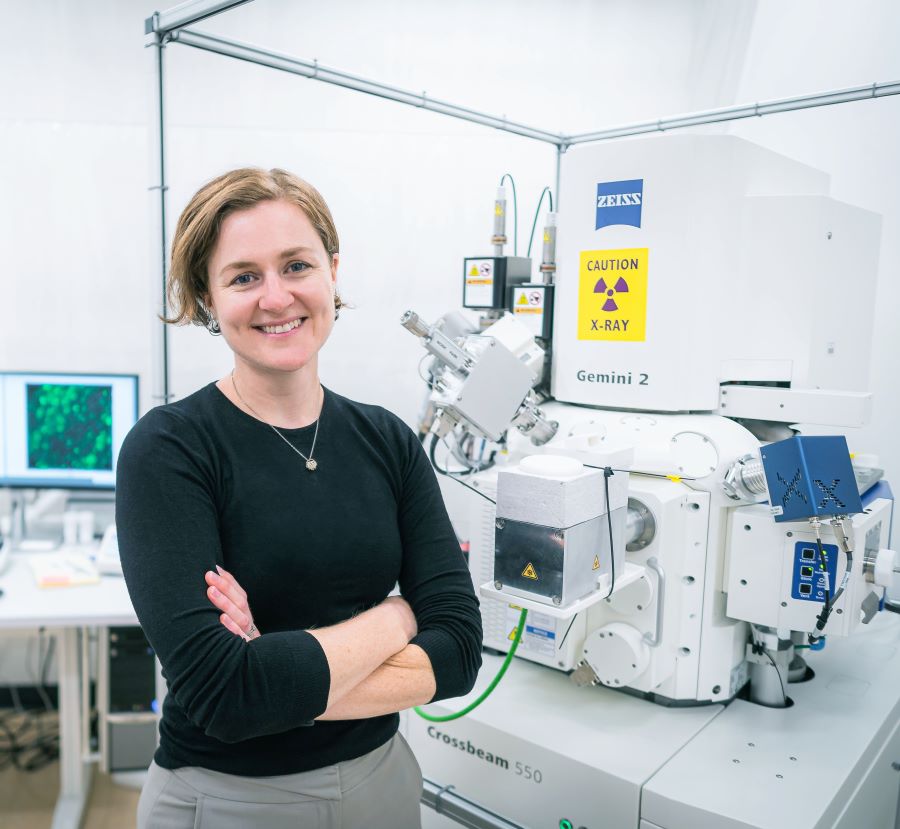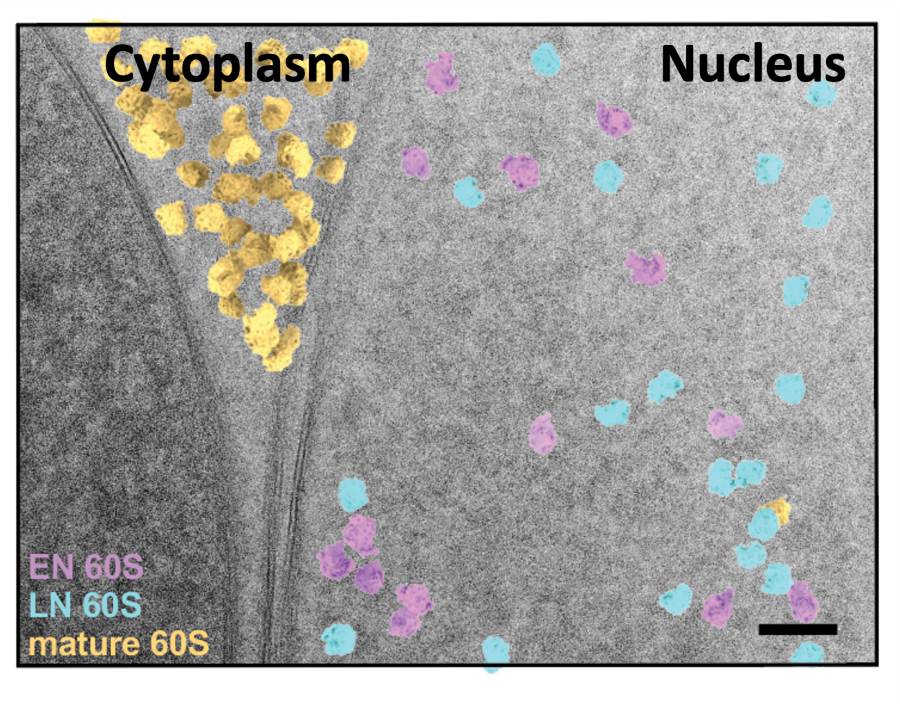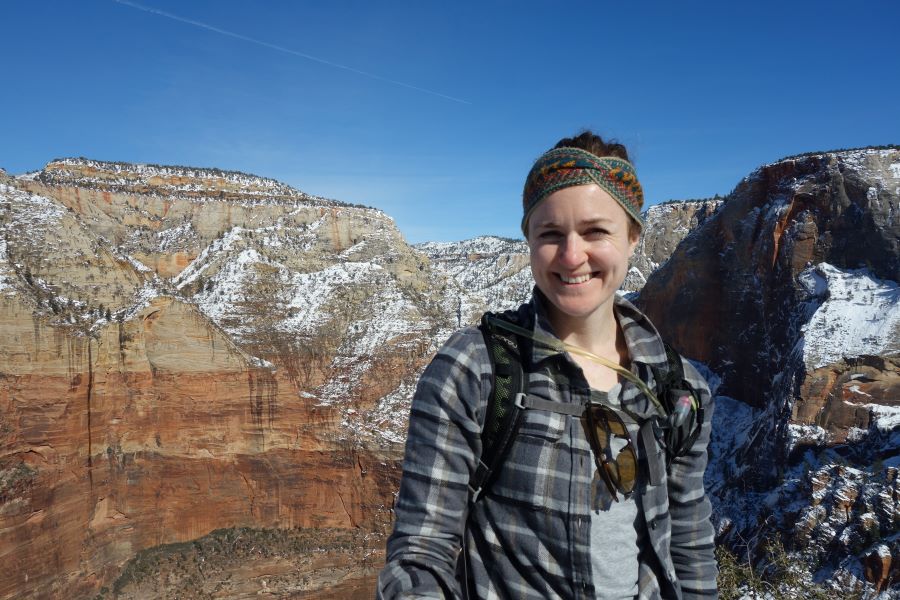
New Faculty Profile | Bronwyn Lucas
Investigating the Molecular Details of Life
By Kirsten Mickelwait

Imagine surveying a broad geography on a topographic map. Now zoom in further to make out trees, then further still to examine the leaves and bark, even to determine what species a tree might be. “That’s the level of detail we're looking for,” Bronwyn Lucas says—only in her research, the “trees” are the proteins inside our cells. Using cryogenic electron microscopy (cryo-EM), Lucas’s lab is exploring new ways of using a growing assortment of atomic-resolution structures and atomistic models to investigate the molecular details of life. In July, Lucas joined MCB as an assistant professor in the Division of Biochemistry, Biophysics and Structural Biology (BBS).
A cell—the smallest living thing and the most basic component of life—still holds so many secrets. Its functions are determined by the type and the structure of all the proteins, among other elements, contained within it. For the last half a century, Lucas explains, scientists have had to pull those components out of the cell to examine their structures.
Now, with cryo-EM, scientists can use high-speed electrons to gather structural information and take high-resolution images within the cell itself, showing how all these elements come together to form a cell, not just how they appear by themselves. “But this is a really challenging problem, because in the cell the proteins are touching and overlapping one another so these images are really noisy and it kind of looks like static,” Lucas says. “So we have to develop computational methods to get a better look at them.” Lucas’s research is building tools to interpret these images of cells at even greater levels of detail to help scientists interpret what they are seeing.
While the Lucas Lab has studied proteins in brewer’s yeast cells, the next step is to apply this process to human cells. Human illness first occurs at the molecular level and the tools the lab is developing can be used to study how mutations might change the molecular structure and interactions of proteins within cells—a very important step in figuring out disease.

“Although we can perceive the changes that might happen to proteins during the disease in individual proteins, we still don't understand how that all works together in the context of inside your cells,” Lucas says. “So the tools and technologies we're building will have impacts across all of biology. That's the goal, anyway!”
Lucas comes to Berkeley from a background in basic molecular biology research. After receiving her PhD from the University of Rochester Medical Center, she did her postdoc at Howard Hughes Medical Institute before becoming a senior research scientist at the University of Massachusetts’ Chan Medical School. She’s enjoying her move to leading a research group academia, which allows her not only to build her own lab and research team but also offers the chance to work directly with students. She’s already gotten acquainted with several “fantastic” undergraduates from the Molecular and Cell Biology and Data Sciences programs. “I just love blowing their minds about the level of detail we're looking at—you know, like that's a ribosome inside a cell right now, you guys!”
Mentoring is also incredibly important to her, and she’s looking forward to creating a space where students can feel safe enough to take risks and try new things. “I think that's absolutely crucial,” she says. “That's how we do our best science.”

In her search for a faculty position, Lucas seriously considered only one place: UC Berkeley. She wanted to work with physicist Holger Müller, who designed the world's first (and currently only), laser phase plate, as well as world leaders in cryo-EM like Bob Glaeser and Eva Nogales. She’d also heard great things about the collegial, collaborative culture at MCB—not always the case at an R1 institution.
A native Australian, Lucas naturally loves all outdoor activities, especially the beach. The time she spent in South Sudan, Ethiopia, and Egypt meeting with refugee groups also had a profound impact and led her to work on wheat genetics before transitioning to medical research. These experiences still influence how she wants to interact with the world, and she hopes eventually to bring a more global focus to her research.
That’s just one more reason why Berkeley is a perfect fit for this new faculty member. “So much about being a research scientist is spending time with your head down, focusing on the work. I'm really excited now to be able to share that and get others excited about it as well,” she says.
Learn more about research in the Lucas Lab: mcb.berkeley.edu/labs/lucas/
Back to Main Fall 2023 Newsletter Page
| Connect With Us! | ||||
 MCB X (formally Twitter) |
 LinkedIn Postdocs, PhDs, or Undergrads |
 Cal Alumni Network |
 Give to MCB |
|
